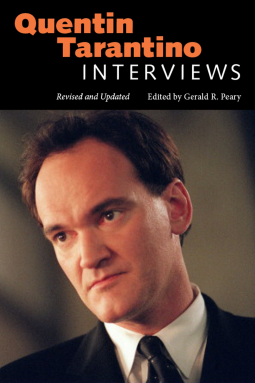
Quentin Tarantino
Interviews, Revised and Updated
by Edited by Gerald Peary
This title was previously available on NetGalley and is now archived.
Send NetGalley books directly to your Kindle or Kindle app
1
To read on a Kindle or Kindle app, please add kindle@netgalley.com as an approved email address to receive files in your Amazon account. Click here for step-by-step instructions.
2
Also find your Kindle email address within your Amazon account, and enter it here.
Pub Date Nov 04 2013 | Archive Date Jan 20 2014
University Press of Mississippi | Conversations with Filmmakers Series
Description
“Rather than spend $600,000 for film school, spend $6,000 for a movie. That’s the best film school in the world.”
Here, in his own colorful, slangy words, is the true American Dream saga of a self-proclaimed “film geek,” with five intense years working in a video store, who became one of the most popular, recognizable, and imitated of all filmmakers. His dazzling, movie-informed work makes Quentin Tarantino’s reputation, from his hipster breakout film, Reservoir Dogs (1992), through Kill Bill: Vol. 1 (2003) and Kill Bill: Vol. 2 (2004), his enchanted homages to Asian action cinema, to his rousing tribute to guys-on-a-mission World War II movie, Inglourious Basterds (2009). For those who prefer a more mature, contemplative cinema, Tarantino provided the tender, very touching Jackie Brown (1997). A masterpiece? Pulp Fiction (1994). A delightful mash of unabashed exploitation and felt social consciousness? His latest opus, Django Unchained (2012).
From the beginning, Tarantino (b. 1963)—affable, open, and enthusiastic about sharing his adoration of movies—has been a journalist’s dream. Quentin Tarantino: Interviews, revised and updated with eleven new interviews, is a joy to read cover to cover because its subject has so much interesting and provocative to say about his own movies and about cinema in general, and also about his unusual life. He is frank and revealing about growing up in Los Angeles with a single, half-Cherokee mother, and dropping out of ninth grade to take acting classes. Lost and confused, he still managed a gutsy ambition: young Quentin decided he would be a filmmaker.
Tarantino has conceded that Ordell (Samuel L. Jackson), the homicidal African American con man in Jackie Brown, is an autobiographical portrait. “If I hadn’t wanted to make movies, I would have ended up as Ordell,” Tarantino has explained. “I wouldn’t have been a postman or worked at the phone company. . . . I would have gone to jail.”
Gerald Peary, Cambridge, Massachusetts, a professor of communication and journalism at Suffolk University in Boston, is a film critic for the Boston Phoenix and the editor of John Ford: Interviews and Samuel Fuller: Interviews. He is the series editor of the Conversations with Filmmakers series.NOVEMBER, 224 pages (approx.), 6 x 9 inches, introduction, chronology, filmography, index
Advance Praise
No Advance Praise Available
No Advance Praise Available
Marketing Plan
No Marketing Info Available
No Marketing Info Available
Available Editions
| EDITION | Paperback |
| ISBN | 9781617038754 |
| PRICE | $25.00 (USD) |






